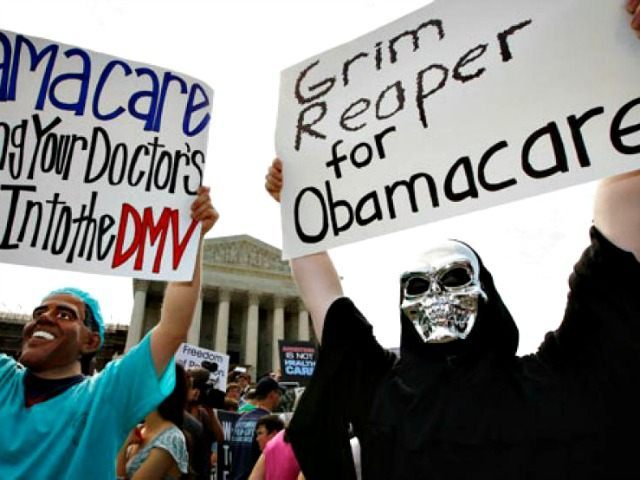An organization of physicians that promotes a return to individualized, patient-centered medicine says if Republicans decide to “tweak” or alter Obamacare, incoming President Donald Trump should use his executive authority to starve the law’s financial mechanisms.
In a newly released white paper, the Association of American Physicians and Surgeons (AAPS) says Obamacare’s mandates and scheme of “coercive redistribution of wealth” should no longer be kept alive because they have allowed the government to keep a “chokehold” on innovation and have prevented “excellence” from thriving.
Obamacare has been built on an “unsound foundation…with so many complex, interdependent parts that attempts to alter parts of it will upset the balance with unpredictable, likely disastrous effects,” states the group, adding that a plan to replace the healthcare law with another poorly considered centralized government program could be equally disastrous.
The group advises incoming President Donald Trump not to wait for Congress to act on President Obama’s signature legislation with a series of “tweaks” or alterations, and explains why Trump should unilaterally allow the law to “wither and die”:
ObamaCare is inextricably tied to the rest of the American “healthcare delivery system.” Besides the radical changes in health insurance and medical institutions, ObamaCare makes many changes in Medicare and Medicaid and heavily depends on them. About half of the “healthcare dollar” passes through these federal programs, and 90 percent passes through some third-party. As with the Leaning Tower of Pisa, there is a legacy to be preserved: the legacy of Barack Obama, but also of Franklin Roosevelt, Lyndon Johnson, Richard Nixon—and Marx and Lenin.
Because of its intended complexity, AAPS urges the GOP to “adopt approaches that can be taken unilaterally by the Trump Administration, without requiring congressional approval.”
“Obamacare can and should be repealed in practice through administrative actions, without awaiting approval by Congress or the judiciary,” AAPS asserts. “The same executive actions that allow ObamaCare to self-destruct would at the same time make it possible for the free market to develop better, actually affordable options.”
For example, AAPS observes that the central financial mechanism of Obamacare is the individual mandate, enforced under threat of penalty by the IRS, which is overseen by the executive branch. Trump, the group says, should block enforcement of the mandate using his executive authority.
“The definition of acceptable coverage is determined by the Department of Health and Human Services (HHS), which did not, for example, have to mandate contraceptive coverage,” AAPS notes as well.
The group contends that the first priority in eliminating Obamacare is to deliver Americans who are trapped in it. AAPS recommends the Trump Administration take executive actions to “let people out,” such as: not enforcing penalties for Americans who don’t purchase health insurance; refusing to bail out insurance companies; and declaring that taxpayer subsidies on the Obamacare healthcare exchanges are illegal.
The organization advises, for example, that people who wish to be let out of the “supposedly voluntary Medicare program” be allowed to leave, without loss of Social Security benefits for leaving Part A. AAPS urges new regulations that allow patients and physicians “to opt out of Medicare and Medicaid on a per-service basis,” similar to what is done in other entitlement programs.
AAPS also addresses the issue of coverage for pre-existing conditions, a facet of Obamacare thought to be especially popular. The group states:
There is now a large pool of people with pre-existing conditions, and a free market is likely to develop appropriate products. Most could be covered at a higher price. Previously existing state high-risk pools could be re-established, as Alaska recently did. As market reforms—and restoring insurance to its role of reimbursing people for catastrophic losses—result in drastic reductions in price, the burden will be much less. For people who need care but can’t afford it, charity is the moral answer. If taxpayers wish to fund a safety net, it is far more equitable to spread the costs over all taxpayers than to impose it on the sick or those who care for them, and far cheaper to pay for the care directly rather than to funnel the money through a middleman.
AAPS provides a list of recommendations here for those who might be uninsured when Obamacare is dismantled.
“Many who are uninsured choose to live that way, using emergency rooms as their point of access when they have a real medical crisis,” the group asserts. “Requiring people to purchase health insurance, as ObamaCare does, is an economically inefficient way to address the problem of uncompensated care.”
Finally, AAPS challenges “key false assumptions” adopted by entities that support big government programs and that have set the narrative for centralized planning schemes like Obamacare. These assumptions include:
We need “universal coverage.” No, we need optimal availability of actual medical care. We need a free market, not mandatory third-party payment.
We need to “contain costs.” No, costs are far too high, mostly because of comprehensive third-party payment. They can and should be greatly reduced.
“We” are all responsible for everybody else’s health care. No, we are responsible of caring for our own health and for paying for the necessities of life, including medical care when appropriate. Comprehensive third-party payment is the most expensive and least efficient way of doing that.
Charity is demeaning; people have a right to help. No, charity is a blessing both to those who give and those who receive. Being dependent on government forced redistribution is both demeaning and debilitating
The federal government can “assure” healthcare for all. No, the government can only take. Each lead brick piled on to stabilize a tottering structure is taken from another, better use and can at most only delay the day of reckoning.
“The legacy we want to preserve is the one of freedom, which brought us prosperity and wonderful advances in medicine,” AAPS concludes. “Piling on more lead to try to salvage the icon of socialism is suppressing a return to greatness in America.”

COMMENTS
Please let us know if you're having issues with commenting.